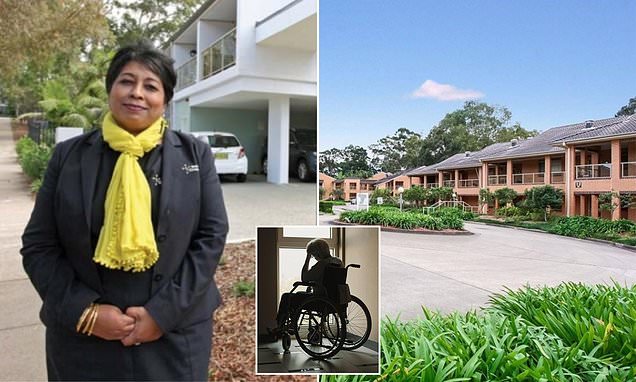
When Sue Daby appeared in aged care marketing materials, she was the picture of compassion.
Daby promised families that their loved ones would receive attention, care, and respect.
Yet, behind the glossy photos and reassuring words, she was secretly taking advantage of seniors under her care and beyond.
Daby, whose real name is Darshee Growhee, was a 58-year-old caretaker who used several aliases, including Sue and Seedheeta Daby. She has now been permanently banned from working in health care after a four-year investigation.
The said investigation uncovered shocking misconduct at Marsfield Residential Aged Care in north Sydney.
Her case highlighted a disturbing reality across Australia: about 17.9 per cent of residential aged care recipients are given antipsychotic medicines despite not being diagnosed with psychosis.
A manager's dark secret exposed
The Health Care Complaints Commission (HCCC) found that Ms Ghowree administered Risperidone, a powerful antipsychotic medication, to residents without their knowledge or consent.
These drugs become what experts call 'chemical restraints', medicines used to control behaviour rather than treat medical conditions.
However, her misconduct went beyond drugging vulnerable residents. The investigation also revealed that she accessed a deceased resident's bank account without proper authority and made transactions from it.
Throughout her tenure, she used her position to ensure that incidents involving residents were either not reported or that the details in reports were incorrect.
Did you know?
Chemical restraints involve using medications—typically antipsychotics, sedatives, or anxiety drugs—to control a person's behaviour rather than treat a medical condition. In aged care, they're often used to make residents 'easier to manage' but can cause serious side effects, including increased risk of falls, pneumonia, and death in elderly people with dementia.
A problem bigger than one bad manager
Ms Ghowree's case isn't an isolated incident. Human Rights Watch research also found evidence of chemical restraints being used in more than 150 aged care facilities across Queensland, Victoria, and New South Wales.
Recent research from Macquarie University found that residents with dementia are still prescribed antipsychotics at twice the rate of those without the condition—23 per cent compared to 11 per cent.
This is despite the introduction of significant reforms following the Royal Commission into Aged Care Quality and Safety.
The problem is often driven by understaffing and inadequate training. For understaffed facilities, chemical restraint can make managing people with dementia easier, especially when staff lack proper support training.
Warning signs families should watch for
While regulatory reforms have strengthened oversight, families remain the first line of defence for their loved ones.
Key warning signs to take note when you have family in aged care facilities:
- Sudden personality changes or excessive drowsiness in your loved one
- Staff reluctance to discuss medications or provide detailed medication lists
- Unexplained bruises, falls, or injuries
- Your relative seems confused, agitated, or different when you visit
- Facility staff discouraging visits or limiting access to your loved one
- Incidents not being properly reported or explained
If you notice these signs, don't hesitate to ask direct questions. You have the right to know what medications your loved one is receiving and why they've been prescribed.
Recent reforms strengthen protections
Since July 2019, aged care providers must use alternative strategies before considering restraints, obtain informed consent, document all decisions, conduct regular reviews, and monitor for signs of distress.
The new Aged Care Act 2024 and Aged Care Rules 2025, which should come into effect by 1 November 2025, could further strengthen these protections.
The reforms also introduced mandatory quality indicators, requiring facilities to report on the use of antipsychotics, physical restraints, and other key safety measures. This creates a paper trail that makes it harder for misconduct to go unnoticed.
The Royal Commission also identified chemical restraint as an urgent priority, calling it a 'significant over-reliance' that needed immediate attention.
The ongoing challenge
Despite these improvements, challenges remain.
As of January 2025, chemical restraint remains legal in Australia as long as it meets legislative requirements, and it's still widely used across many facilities.
The key is to ensure that the 'last resort' principle is genuinely followed. Too often, medication becomes the first solution rather than exploring alternatives like better pain management, environmental changes, or addressing underlying needs.
Your voice matters
Ms Ghowree's permanent ban sends a clear message that aged care abuse has serious consequences.
However, the system only works when people are vigilant and willing to speak up.
If you have concerns about the care your loved one is receiving, contact the Aged Care Quality and Safety Commission on 1800 951 822. You can also lodge complaints with your state's Health Care Complaints Commission.
The aged care sector has committed to doing better, but it needs families, staff, and the community to hold it accountable. After all, we're not just talking about statistics or regulations—we're talking about the people who deserve nothing less than dignity and respect in their final years.
Have you had experiences with aged care oversight, or do you have questions about your rights as a family member? We'd love to hear from you in the comments below.
Primary source

Aged care nurse banned from health care after 'drugging residents'
An aged care facility manager has been banned from working in health care over her treatment of residents after a four-year investigation.www.dailymail.co.uk
Restrictive Practices: Chemical Restraint | Ausmed
Cited text: 'The latest data from the National Aged Care Mandatory Quality Indicator Program reveals that 17.9% of residential aged care recipients are being given...'
Excerpt: Her case highlighted a disturbing reality across Australia: about 17.9 per cent of residential aged care recipients are given antipsychotic medicines despite not being diagnosed with psychosis.
Australia: Chemical Restraint Persists in Aged Care | Human Rights Watch
Cited text: 'A Human Rights Watch review of non-compliance reports for aged care facilities across Australia from July 1, 2020, to June 30, 2021, found use of chem...'
Excerpt: The Health Care Complaints Commission (HCCC) found that Ms Ghowree administered Risperidone, a powerful antipsychotic medication, to residents without their knowledge or consent.

Australia: Chemical Restraint Persists in Aged Care
The Australian government should end nursing homes’ use of chemical restraints to control the behavior of older people with dementia, Human Rights Watch said today.www.hrw.org
“Fading Away”: How Aged Care Facilities in Australia Chemically Restrain Older People with Dementia | HRW
Cited text: 'This report is based on interviews with family members, doctors, nurses, and advocates, and documents the use of medications as chemical restraint in ...'
Excerpt: Ms Ghowree's case isn't an isolated incident. Human Rights Watch research also found evidence of chemical restraints being used in more than 150 aged care facilities across Queensland, Victoria, and New South Wales.

“Fading Away”
This report found that instead of providing support to older people with dementia, facilities use drugs to control their behavior, a practice known as chemical restraint. Many of the drugs used to control people in aged care facilities are antipsychotics that are not approved in Australia for...www.hrw.org
Study focuses on chemical restraints in aged care—National Seniors Australi
Cited text: 'So, it comes as a surprise that residents with dementia are still prescribed antipsychotics at twice the rate of those without the condition.'
Excerpt: Recent research from Macquarie University found that residents with dementia are still prescribed antipsychotics at twice the rate of those without the condition—23 per cent compared to 11 per cent.

Study focuses on chemical restraints in aged care
Recent Australian research reveals persistent high use of antipsychotics in aged care residents living with dementia. nationalseniors.com.au
nationalseniors.com.au
Australia: Royal Commission Finds Aged Care Horrors | Human Rights Watch
Cited text: 'The Royal Commission highlighted the need “to respond to the significant over-reliance on chemical restraint in aged care” as an urgent priority among...'
Excerpt: The Royal Commission also identified chemical restraint as an urgent priority, calling it a 'significant over-reliance' that needed immediate attention.

Australia: Royal Commission Finds Aged Care Horrors
The Australian government should act on the Royal Commission of Inquiry’s report criticizing the its failure to protect older people in aged care from chemical restraint and other abuseswww.hrw.org







